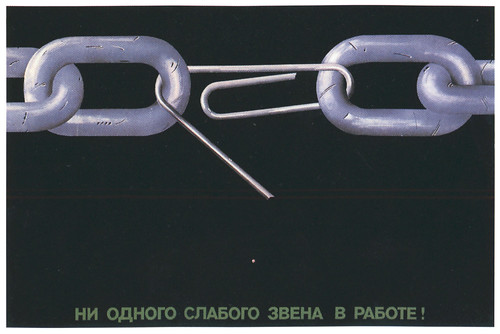historical and contemporary propaganda
 Things Magazine is rapidly becoming my favorite blog, sort of a hyperlinked Harper's Weekly with more thought to content than numbers. Today they led to a discussion over at Penmachine.com on Nazi vs. Soviet propaganda. Discussing why people still admire the posters from Sovietism, and a Charles Taylor review of Martin Amis's Koba the Dread, Derek Miller writes:
Things Magazine is rapidly becoming my favorite blog, sort of a hyperlinked Harper's Weekly with more thought to content than numbers. Today they led to a discussion over at Penmachine.com on Nazi vs. Soviet propaganda. Discussing why people still admire the posters from Sovietism, and a Charles Taylor review of Martin Amis's Koba the Dread, Derek Miller writes:
Reviewing Amis's book, Charles Taylor writes that perhaps "Stalin's ends—collectivization, industrialization, even the attainment of absolute power—were at least comprehensible (which is not to say right, desirable or even thought-out) although the means he used to achieve them were barbaric. Hitler employed rational, industrialized means (one could even call them 'neat' and therein lies part of the offense) toward an irrational end: the physical elimination of every Jew."Earlier in the review of the Amis book though, Taylor writes:Maybe, maybe. It remains true that many of us can browse those Soviet posters without feeling ill, in fact even admiring them.
For many of us on the left, anti-communism has so often led to the excesses of the right that it became an ideological taint to avoid. Who, for instance, would want to believe in Alger Hiss' guilt when that meant finding oneself on the same side as Richard Nixon? But neither McCarthyism nor the execution of the Rosenbergs (who were, of course, guilty) is an adequate excuse for denying the facts of Stalin's terror, or Mao's Great Leap Forward, or -- on a lesser scale -- Castro's persecution of homosexuals, among other groups.But neither is anti-communism an excuse for denying the guilt of Ronald Reagan, (75,000 dead in Guatamala, entire villages of "communists" raized in Nicaragua, some 30 - 40 thousand dead there.) So for me, it is quite easy to imagine the Soviet graphic artist doing what he loves doing for a greater, albeit Soviet, end. I am not sure if Taylor means to suggest that Cheney-ism is well thought out, or somehow successful, though perhaps someone as well thought-out as Hitchens might agree it is.
I spent most of my life wondering just how exactly did street level Naziism develop, how did people tolerate it and allow it to grow like a hideous weed cracking the concrete of society ? But i don't wonder about that anymore. Cheney-ism, while taking its economic cues entirely from Soviet Russia, (now you see where Condi Rices expertise is so useful), relies on the rabid hatred and sadism of those flag waving GOP operatives and chanting poor "patriots" to flush money from the treasury straight into the vaults of the most fervently anti-liberal, anti-democratic and anti-western.
So yeah, the utopian posters that masked the Soviet death machine still vibrate slightly with the intent and vision of their makers, a far cry from the degeneracy of those who opposed them, for of course, Naziism was, in some sense, merely an early anti-communist movement. The propaganda of those who now, supposedly, oppose state power is, for my beans, far more repulsive.


No comments:
Post a Comment